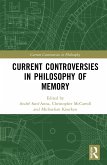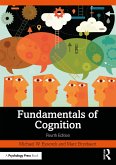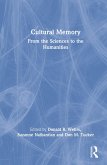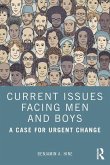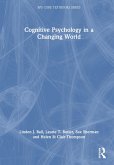Current Issues in Memory
Memory Research in the Public Interest
Herausgeber: Rummel, Jan
Current Issues in Memory
Memory Research in the Public Interest
Herausgeber: Rummel, Jan
- Broschiertes Buch
- Merkliste
- Auf die Merkliste
- Bewerten Bewerten
- Teilen
- Produkt teilen
- Produkterinnerung
- Produkterinnerung
Current Issues in Memory is a series of edited books that reflect the state-of-the-art areas of current and emerging interest in the psychological study of Memory.
Andere Kunden interessierten sich auch für
![Current Controversies in Philosophy of Memory Current Controversies in Philosophy of Memory]() Current Controversies in Philosophy of Memory163,99 €
Current Controversies in Philosophy of Memory163,99 €![Fundamentals of Cognition Fundamentals of Cognition]() Michael W. Eysenck (Emeritus Professor of Psychology in the psycholFundamentals of Cognition63,99 €
Michael W. Eysenck (Emeritus Professor of Psychology in the psycholFundamentals of Cognition63,99 €![Cultural Memory Cultural Memory]() Cultural Memory165,99 €
Cultural Memory165,99 €![Current Issues Facing Men and Boys Current Issues Facing Men and Boys]() Benjamin A. HineCurrent Issues Facing Men and Boys42,99 €
Benjamin A. HineCurrent Issues Facing Men and Boys42,99 €![Cognitive Psychology in a Changing World Cognitive Psychology in a Changing World]() Linden J. BallCognitive Psychology in a Changing World183,99 €
Linden J. BallCognitive Psychology in a Changing World183,99 €![The New Psychology of Language The New Psychology of Language]() Ton DijkstraThe New Psychology of Language55,99 €
Ton DijkstraThe New Psychology of Language55,99 €![A History of the Brain A History of the Brain]() Andrew P. Wickens (UK University of Central Lancashire)A History of the Brain187,99 €
Andrew P. Wickens (UK University of Central Lancashire)A History of the Brain187,99 €-
-
-
Current Issues in Memory is a series of edited books that reflect the state-of-the-art areas of current and emerging interest in the psychological study of Memory.
Hinweis: Dieser Artikel kann nur an eine deutsche Lieferadresse ausgeliefert werden.
Hinweis: Dieser Artikel kann nur an eine deutsche Lieferadresse ausgeliefert werden.
Produktdetails
- Produktdetails
- Current Issues in Memory
- Verlag: Taylor & Francis Ltd
- Seitenzahl: 404
- Erscheinungstermin: 16. März 2021
- Englisch
- Abmessung: 157mm x 235mm x 34mm
- Gewicht: 648g
- ISBN-13: 9780367618247
- ISBN-10: 0367618249
- Artikelnr.: 60603677
- Herstellerkennzeichnung
- Libri GmbH
- Europaallee 1
- 36244 Bad Hersfeld
- 06621 890
- Current Issues in Memory
- Verlag: Taylor & Francis Ltd
- Seitenzahl: 404
- Erscheinungstermin: 16. März 2021
- Englisch
- Abmessung: 157mm x 235mm x 34mm
- Gewicht: 648g
- ISBN-13: 9780367618247
- ISBN-10: 0367618249
- Artikelnr.: 60603677
- Herstellerkennzeichnung
- Libri GmbH
- Europaallee 1
- 36244 Bad Hersfeld
- 06621 890
Jan Rummel is a designated Heisenberg Professor and the principal investigator of the Cognition and Attention Regulation Laboratory (CARL) at Heidelberg University, Germany. His research focuses on the cognitive processes involved in prospective memory, intentional forgetting, and the regulation of attention.
Section 1: Memory representations: From (visual) perception to stored
information
1. The Organisation of Visuo-Spatial Working Memory: Evidence from the
Study of Developmental Disorders.
Cesare Cornoldi and Irene C. Mammarella
2. Visual memory, spatial representation, and navigation
Amy L. Shelton and Naohide Yamamoto
3. Remembering Faces
Vicki Bruce
4. Memory for real-world scenes
Andrew Hollingworth
Section 2: Memory adaptations: Forgetting the past, remembering the future
5. The role of retroactive interference and consolidation in everyday
forgetting
John T. Wixted
6. Autobiographical Forgetting, Social Forgetting and Situated Forgetting:
Forgetting in Context
Celia B. Harris, John Sutton, & Amanda J. Barnier
7. Take The Field! Investigating prospective memory in naturalistic and
real-life settings
Jan Rummel & Lia Kvavilashvili
8. Prospective Memory In Safety-Critical Work Contexts
Shayne Loft, Key Dismukes, & Tobias Grundgeiger
Section 3: Memory limitations: False memories
9. False Memories Matter: The repercussions that follow the development of
false memory
Cara Laney and Elizabeth F. Loftus
10.Photos And Memory
Kimberley A. Wade, Sophie J. Nightingale, and Melissa F. Colloff
11. Forced Fabrication And False Eyewitness Memories
Maria S. Zaragoza, Patrick Rich, Eric Rindal, and Rachel DeFranco
12. When Children Are The Worst And Best Eyewitnesses: Factors Behind The
Development Of False Memory
Henry Otgaar, Mark L. Howe, Nathalie Brackmann, and Jianqin Wang
13. Factors affecting the reliability of children's forensic reports: An
updated review
Kamala London, Sarah Kulkofsky, and Christina O. Perez
Section 4: Memory augmentations: How can memory capacities be improved?
14. Individual differences in working memory and aging
Timothy A. Salthouse
15. Working memory training in late adulthood: A behavioral and brain
perspective
Anna Stigsdotter Neely and Lars Nyberg
16. More than just a memory: The nature and validity of working memory in
educational settings
Darren S. Levin, S. Kenneth Thurman and Marissa H. Kiepert
17. Bene¿ts of testing memory: Best practices and boundary conditions
Henry L. Roediger, III, Pooja K. Agarwal, Sean H. K. Kang and Elizabeth J.
Marsh
information
1. The Organisation of Visuo-Spatial Working Memory: Evidence from the
Study of Developmental Disorders.
Cesare Cornoldi and Irene C. Mammarella
2. Visual memory, spatial representation, and navigation
Amy L. Shelton and Naohide Yamamoto
3. Remembering Faces
Vicki Bruce
4. Memory for real-world scenes
Andrew Hollingworth
Section 2: Memory adaptations: Forgetting the past, remembering the future
5. The role of retroactive interference and consolidation in everyday
forgetting
John T. Wixted
6. Autobiographical Forgetting, Social Forgetting and Situated Forgetting:
Forgetting in Context
Celia B. Harris, John Sutton, & Amanda J. Barnier
7. Take The Field! Investigating prospective memory in naturalistic and
real-life settings
Jan Rummel & Lia Kvavilashvili
8. Prospective Memory In Safety-Critical Work Contexts
Shayne Loft, Key Dismukes, & Tobias Grundgeiger
Section 3: Memory limitations: False memories
9. False Memories Matter: The repercussions that follow the development of
false memory
Cara Laney and Elizabeth F. Loftus
10.Photos And Memory
Kimberley A. Wade, Sophie J. Nightingale, and Melissa F. Colloff
11. Forced Fabrication And False Eyewitness Memories
Maria S. Zaragoza, Patrick Rich, Eric Rindal, and Rachel DeFranco
12. When Children Are The Worst And Best Eyewitnesses: Factors Behind The
Development Of False Memory
Henry Otgaar, Mark L. Howe, Nathalie Brackmann, and Jianqin Wang
13. Factors affecting the reliability of children's forensic reports: An
updated review
Kamala London, Sarah Kulkofsky, and Christina O. Perez
Section 4: Memory augmentations: How can memory capacities be improved?
14. Individual differences in working memory and aging
Timothy A. Salthouse
15. Working memory training in late adulthood: A behavioral and brain
perspective
Anna Stigsdotter Neely and Lars Nyberg
16. More than just a memory: The nature and validity of working memory in
educational settings
Darren S. Levin, S. Kenneth Thurman and Marissa H. Kiepert
17. Bene¿ts of testing memory: Best practices and boundary conditions
Henry L. Roediger, III, Pooja K. Agarwal, Sean H. K. Kang and Elizabeth J.
Marsh
Section 1: Memory representations: From (visual) perception to stored
information
1. The Organisation of Visuo-Spatial Working Memory: Evidence from the
Study of Developmental Disorders.
Cesare Cornoldi and Irene C. Mammarella
2. Visual memory, spatial representation, and navigation
Amy L. Shelton and Naohide Yamamoto
3. Remembering Faces
Vicki Bruce
4. Memory for real-world scenes
Andrew Hollingworth
Section 2: Memory adaptations: Forgetting the past, remembering the future
5. The role of retroactive interference and consolidation in everyday
forgetting
John T. Wixted
6. Autobiographical Forgetting, Social Forgetting and Situated Forgetting:
Forgetting in Context
Celia B. Harris, John Sutton, & Amanda J. Barnier
7. Take The Field! Investigating prospective memory in naturalistic and
real-life settings
Jan Rummel & Lia Kvavilashvili
8. Prospective Memory In Safety-Critical Work Contexts
Shayne Loft, Key Dismukes, & Tobias Grundgeiger
Section 3: Memory limitations: False memories
9. False Memories Matter: The repercussions that follow the development of
false memory
Cara Laney and Elizabeth F. Loftus
10.Photos And Memory
Kimberley A. Wade, Sophie J. Nightingale, and Melissa F. Colloff
11. Forced Fabrication And False Eyewitness Memories
Maria S. Zaragoza, Patrick Rich, Eric Rindal, and Rachel DeFranco
12. When Children Are The Worst And Best Eyewitnesses: Factors Behind The
Development Of False Memory
Henry Otgaar, Mark L. Howe, Nathalie Brackmann, and Jianqin Wang
13. Factors affecting the reliability of children's forensic reports: An
updated review
Kamala London, Sarah Kulkofsky, and Christina O. Perez
Section 4: Memory augmentations: How can memory capacities be improved?
14. Individual differences in working memory and aging
Timothy A. Salthouse
15. Working memory training in late adulthood: A behavioral and brain
perspective
Anna Stigsdotter Neely and Lars Nyberg
16. More than just a memory: The nature and validity of working memory in
educational settings
Darren S. Levin, S. Kenneth Thurman and Marissa H. Kiepert
17. Bene¿ts of testing memory: Best practices and boundary conditions
Henry L. Roediger, III, Pooja K. Agarwal, Sean H. K. Kang and Elizabeth J.
Marsh
information
1. The Organisation of Visuo-Spatial Working Memory: Evidence from the
Study of Developmental Disorders.
Cesare Cornoldi and Irene C. Mammarella
2. Visual memory, spatial representation, and navigation
Amy L. Shelton and Naohide Yamamoto
3. Remembering Faces
Vicki Bruce
4. Memory for real-world scenes
Andrew Hollingworth
Section 2: Memory adaptations: Forgetting the past, remembering the future
5. The role of retroactive interference and consolidation in everyday
forgetting
John T. Wixted
6. Autobiographical Forgetting, Social Forgetting and Situated Forgetting:
Forgetting in Context
Celia B. Harris, John Sutton, & Amanda J. Barnier
7. Take The Field! Investigating prospective memory in naturalistic and
real-life settings
Jan Rummel & Lia Kvavilashvili
8. Prospective Memory In Safety-Critical Work Contexts
Shayne Loft, Key Dismukes, & Tobias Grundgeiger
Section 3: Memory limitations: False memories
9. False Memories Matter: The repercussions that follow the development of
false memory
Cara Laney and Elizabeth F. Loftus
10.Photos And Memory
Kimberley A. Wade, Sophie J. Nightingale, and Melissa F. Colloff
11. Forced Fabrication And False Eyewitness Memories
Maria S. Zaragoza, Patrick Rich, Eric Rindal, and Rachel DeFranco
12. When Children Are The Worst And Best Eyewitnesses: Factors Behind The
Development Of False Memory
Henry Otgaar, Mark L. Howe, Nathalie Brackmann, and Jianqin Wang
13. Factors affecting the reliability of children's forensic reports: An
updated review
Kamala London, Sarah Kulkofsky, and Christina O. Perez
Section 4: Memory augmentations: How can memory capacities be improved?
14. Individual differences in working memory and aging
Timothy A. Salthouse
15. Working memory training in late adulthood: A behavioral and brain
perspective
Anna Stigsdotter Neely and Lars Nyberg
16. More than just a memory: The nature and validity of working memory in
educational settings
Darren S. Levin, S. Kenneth Thurman and Marissa H. Kiepert
17. Bene¿ts of testing memory: Best practices and boundary conditions
Henry L. Roediger, III, Pooja K. Agarwal, Sean H. K. Kang and Elizabeth J.
Marsh


